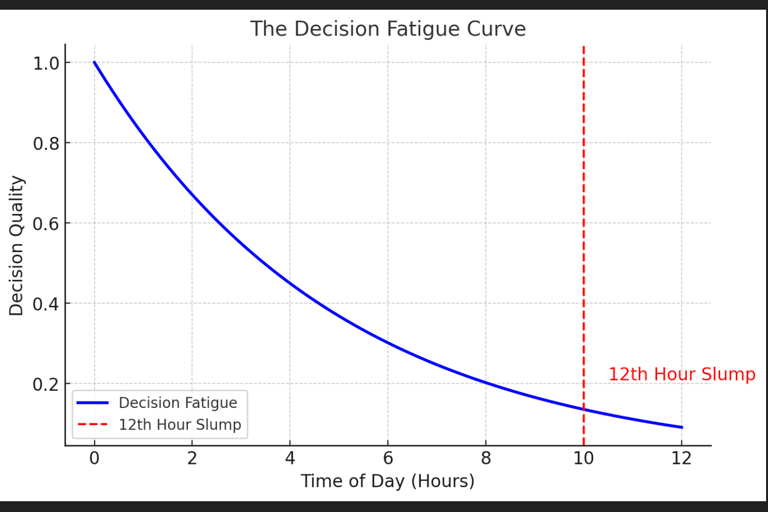The Decision Fatigue: Are We Paying the Price?


We all understand that decision making is the life skill, and we consistently make decisions in a day, and making decisions can be exhausting. Its not about most of the decisions we make intuitively however the decisions that takes a cognitive load are the ones that cause the fatigue.
But what about when the fatigue isn’t just about poor choices, but also about the inconsistencies that can impact our work, people around us or personal life?
And it’s not only decision fatigue, there is a cost to making poor or inconsistent decisions.
Let’s understand decision fatigue and how it affects us!
"Decision fatigue is the concept that after making many decisions, your ability to make more and more decisions over the course of a day becomes worse."
By the time we hit the 12th hour of a workday, our mind is drained, and what seemed like easy choices earlier now feel much harder to make.
This leads to a decline in the quality and consistency of our decisions.
To simplify it, see the graph below


If we look at the collaborative work by Kahneman, beyond his work in system 1 and 2, here it lists the variability in decision making. Read: Noise: A Flaw in Human Judgment to learn more about it.
As I attempt to summarise below
Kahneman’s Work on Noise: Inconsistency in Judgment
In his book Noise, D Kahneman gets deeper into the phenomenon of judgment variability the randomness that can affect decision-making, even among experts, and by the same person for a similar situation in under different circumstances.
When people are fatigued, their decisions can fluctuate dramatically based on factors unrelated to the situation at hand.
Such as:
Time of day: As energy dips throughout the day, decisions can become less reliable, even for high-level executives.
Mood or personal bias: Mental states that aren’t directly connected to the decision at hand can cloud judgment.
Kahneman explains that noise leads to inconsistent decisions—decisions that are not based on the same principles each time. This can have serious implications, especially in business settings where predictability and consistency are crucial for success.
The Price for Decision Fatigue?
The impact of decision fatigue may not always immediately be visible. However it can add-up over time and affect our personal, work, and overall well-being.
Below are few areas where decision fatigue takes a toll and cost us.
a. Burnout and Mental Exhaustion
Over time, decision fatigue can contribute to a burnout.
This burnout can eventually lead to emotional exhaustion, disengagement, and decreased satisfaction in both work and personal life.
b. Inconsistent Judgment
As we get mentally exhausted from too many decisions, our judgment becomes erratic. This inconsistency, known as "noise" in judgment, can result in choices that don’t align with our values or long-term goals.
c. Poor Decision Quality
When fatigued, we become more prone to making shortcuts—opting for easier, less thought-out solutions. While this may feel like a quick fix, it often leads to poor long-term outcomes, missed opportunities, and mistakes that could have been avoided with a bit more mental clarity.
d. Relationship Strain
Decision fatigue can lead to communication breakdowns and poor interpersonal decisions.
We can even fail to engage meaningfully with people because our mental resources are spread too thin.
e. Productivity Drop
The constant drain of decision-making leaves us with less energy to focus on important tasks. We spend more time second-guessing our decisions or simply avoiding them, leading to delays, mistakes, and missed deadlines.
We briefly highlighted that there is a link between decision fatigue and inconsistent judgments. Also the impact of decision fatigue to our lives.
In the next section, I will explore practical ways to combat decision fatigue and maintain decision quality throughout the day.
Practical Ways to Combat Decision Fatigue
Here are several practical strategies, backed by academic insights, to reduce the impact of decision fatigue on your decisions and actions. I’ve also added references where applicable to build credibility:
1. Prioritize and Batch Your Decisions
Reference:
A study by Baumeister found that decision-making is a limited resource, sand it depletes over time. It mentions how decision fatigue can cause to poor impulses in personal lives for people in high offices.
To address this, one can prioritizing critical decisions early in the day when our cognitive resources are fresh is crucial for sustaining judgment quality throughout the day.
Batching tasks together is also a recommended strategy to avoid decision overload. According to Cal Newport’s concept of “deep work” (2016), setting designated times for high-focus tasks allows for sustained concentration without constant mental shifting.
As the decision load increases, focusing on our most important choices first will keep our cognitive processes clear and will help to reduce the possibility to lapse in decision fatigue over time.
2. Automate Routine Decisions
Reference:
David Allen’s “Getting Things Done” methodology (2001) suggests the power of automation and decision reduction to optimize productivity.
“The theory operates with the belief that the more information you're mentally keeping track of, the less productive and focused you are.
Instead of relying on your brain, the “Get Thing Done” methodology encourages to store all the work-information in an external, organized source of truth”
Using decision tools (e.g., scheduling apps, preset workflows) to minimize daily trivial decisions helps preserve cognitive resources for more significant, impactful choices.
3. Take Cognitive Breaks
Studies demonstrated that stepping away from a problem and giving your mind time to rest can enhance problem-solving and decision-making when you return to it.
Breaks, even short ones, reset cognitive focus and can prevent fatigue from degrading decision quality.
Implementing micro-breaks (brief, 5-minute pauses) or mindfulness practices has been shown to improve mental clarity and decision consistency by giving the brain time to recharge.
4. Share Decision-Making
Research professes that human mind has limited cognitive resources. Thus it becomes very important to work on collaborative decision-making. It would allow the cognitive load to be shared, leading to lower exhaustion and freeing your faculties to better outcomes.
Importantly delegation is not about avoiding decisions; but it is to tap into the strengths of others to make higher-quality decisions.
5. Set Boundaries and Reduce Overload
In the book The 4-Hour Workweek” (2007), Tim Ferriss, mentions
“Four hours is just about the maximum length of time your brain can optimally soak up information. Beyond that, you're basically beating a dead horse and wasting valuable time trying to put letters into an already full post box.”
Limiting our decision-making exposure by saying no to unnecessary commitments or simplifying the schedule is critical to preserve cognitive energies.
If we can control over number of decisions we come across, we can avoid the overload that ultimately diminishes the quality of your choices.
Setting boundaries around when and how decisions are made ensures we stay energized and effective.
In Conclusion
As we continue to navigate in an ever-demanding world, we should remember that the path to better decisions isn’t just about putting extra hours of work.
By prioritizing, automating, and sharing decision-making, we can ensure that we remain sharp, consistent, and capable of making good decisions. At Decision Design Lab, our attempt is to bring about these changes in our lives where decision making becomes an easier exercise thus help us improve our quality of professional and personal lives.
So, the next time decisions overwhelm you, ask yourself: Are you managing your mental resources in the best way possible, or are you allowing decision fatigue to steer the wheel?


